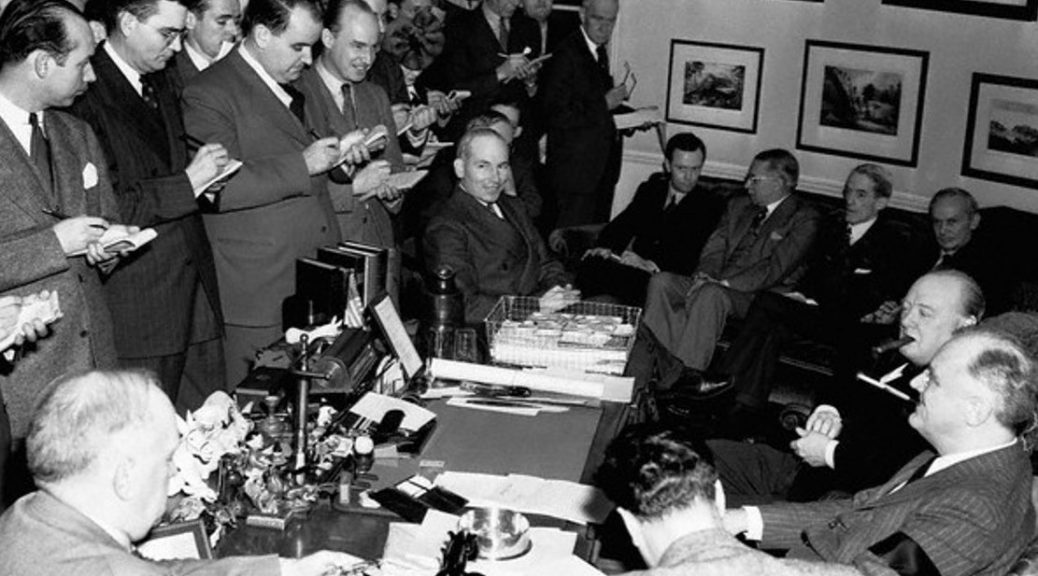
Churchill had how many ideas a day? How many were good?
Q: “Who made the crack that Churchill had a hundred ideas a day but only four of them were good?” —Bruce Saxton, Trenton, N.J.
A: There are several candidates and variations. Taking them as a group, Churchill had from six to 100 ideas daily, of which between one and six were good. In order of the most likely. But it could be one of those all-purpose cracks applied to many people.
Roosevelt: fifty to 100 ideas, three or four good.
President Roosevelt is the most likely to have said this, since he’s quoted more than anyone else. Lord Moran, Churchill’s doctor, heard the line from Frances Perkins, Roosevelt’s Secretary of Labor. In his alleged diaries, Moran was with WSC in Marrakesh in December 1947. “When I told him that Frances Perkins had quoted the President as saying that Winston had a hundred ideas a day and that four of them were good, he blew up: ‘It is impertinent of Roosevelt to say this. It comes badly from a man who hadn’t any ideas at all.'” That was an unusually rough dismissal of FDR—but possible. WSC was then writing his early war memoirs.
The journalist Colin Coote, longtime friend of Churchill and secretary of The Other Club, might have had this from Moran, but he published it before Moran did. Coote wrote the chapter, “Churchill the Journalist,” in Charles Eade’s excellent compilation, Churchill by His Contemporaries (1953). Churchill, Coote wrote, had “a prodigious memory and a mental activity like a dynamo. ‘He has,’ said the late President Roosevelt, ‘a hundred ideas a day, of which at least four are good.’ Moreover, he does not forget what he has read; and since he has now read a lot he is a walking reference library.”
In 1988 William Manchester repeated the FDR line but changed a number in The Last Lion, volume 2: “Franklin Roosevelt later said: ‘Winston has fifty ideas a day, and three or four are good.'” He provides no footnote. Since he wasn’t always pinpoint accurate, he might have got the “fifty” wrong.
Alanbrooke: Ten ideas, one good.
Andrew Roberts in Hitler and Churchill offered a dual credit. Of Churchill he wrote: “He had an astonishingly fertile mind: ‘Winston had ten ideas every day,’ his Chief of the Imperial General Staff Lord Alanbrooke used to say of him, ‘only one of which was good, and he did not know which it was.'” But then Roberts adds that “Roosevelt made a very similar remark, saying that the Prime Minister had a hundred ideas a day of which six were good (a much larger number if an even lower percentage).” Fine historian that he is, Roberts expanded on the theme:
Nothing was too minute a detail to escape Churchill’s notice. He laid down the precise number of apes that should occupy the Rock of Gibraltar (twenty-four), tried to find out whether captured First World War trophy weapons could be reconditioned for use, worried about the animals in London Zoo during the bombing, and made sure that beer rations went to the fighting men at the front before those behind the lines. He even tried to discover whether wax might be used to protect the hearing of soldiers during bombardments.
Duke of Kent: Six ideas, zero to six good.
In Menzies and Churchill at War, the critic David Day writes that Prince George Duke of Kent told Australian Prime Minister Robert Menzies that Churchill “has six ideas a day; they can’t all be right!” Day adds: “For such an ardent Royalist as Menzies, this apparent Royal displeasure with Churchill must have weighed heavily.” Menzies later became more critical of Churchill.
Lloyd George: Ten ideas, one good.
Another critic, Keith Sainsbury, wrote in Churchill and Roosevelt at War: “Roosevelt’s intelligence was not, perhaps, primarily a creative one, but to compensate for this he was extremely receptive to new ideas and would take them from as wide a range of sources as possible…. Churchill, however, was inordinately fertile in ideas, which flowed from him in a steady stream, but less sure in judgment. His early mentor, Lloyd George, had remarked of him, ‘There’s Winston, now. He has ten ideas a day, but he does not know which is the right one.'”
Verdict: FDR
It seems most likely that crack about Churchill was uttered by Roosevelt. Whether Lloyd George preceded him is a good question, and possible—LG had a pretty good wit. The others might have heard the FDR remark and kept it in readiness for their own version. Or, some gnomologist (see “Churchillian Drift” for the definition) may reveal that all these are variations on an ancient witticism dating much farther back!






